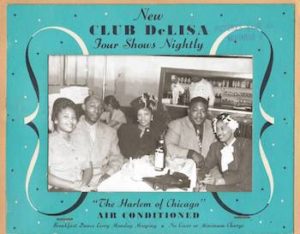
Advertisement, 1950
*This date celebrates the opening of Club DeLisa in 1933. Owned by white-American Italians, the four DeLisa brothers, it was an African-American-themed nightclub and music venue in Chicago, Illinois.
Located at 5521 South State Street (State Street and Garfield Avenue, on the South Side), it was possibly the most prestigious venue in the city, together with the Regal Theater and the Rhumboogie Café in 20th century Chicago. The 1000-seat Club DeLisa played a key role in the city's association with jazz, blues, rhythm and blues, and soul music. The Club DeLisa’s original building burned down but was soon replaced with the New Club DeLisa. Nightly entertainment at the club was in a variety-show format.
The show featured singers, comedians, dancers, and the DeLisa chorines, accompanied by a house band that ranged in size from 7 to 12 pieces, depending on the club's revenues. Another less-announced source of revenue was gambling in the club's basement. During its heyday in the 1930s and 1940s, the club would remain open 24 hours a day, offering round-the-clock entertainment with musicians, dancers, and vaudeville acts.
Among the musicians and performers associated with the venue over the years was Red Saunders, whose band was in residence from 1937 until 1945 and returned in 1947. The band stayed until the club closed in 1958. Fletcher Henderson, Count Basie, Sun Ra, Johnny Pate, Joe Williams, LaVaughn Robinson, George Kirby, Sonny Cohn, Earl Washington, Leon Washington, Albert Ammons, LaVern Baker, and Reverend Gatemouth Brown played there. The Club DeLisa closed its doors on February 16, 1958, after two of the DeLisa brothers died, but was re-opened as The Club in 1966.